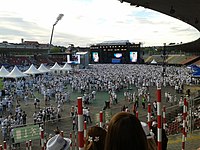Auestadion
It is used mainly for football matches and athletic events and is the home stadium of KSV Hessen Kassel.
The foundations for the new stadium grandstand was built from 100,000 m3 of World War II debris from the city centre of Kassel.
It had a cantilevered steel roof, enabling uninterrupted views of the playing surface from the stand for the supporters.
It was only the second stadium in Germany to incorporate a cantilevered roof, following the Heinz Hilten designed Rosenaustadion in Augsburg that was built two years prior in 1951.
[3] In additional to the roof and seating capacity, the grandstand incorporated glazed exterior walls, a dedicated section for the media and change rooms for players and officials.
On 23 August 1953, the Auestadion was officially opened by Hessian Prime Minister Georg-August Zinn in front of 20,000 people.
A top division football match between Auestadian's first tenants KSV Hessen Kassel and Bavarian opponents Viktoria Aschaffenburg was played to inaugurate the opening.
On 17 June 1956, to mark the completion, an inauguration ceremony was held along with an athletics festival attended by 12,000 spectators.
Designed by Norbert Harle, each of these new stands had a cantilevered roof like the grandstand and seating capacity for 700 people.
[2] 2003 to 2009 Between 2003 and 2009 the City of Kassel planned two phases of upgrades to the stadium to improve both athletics and football experiences at the venue.
A new tunnel on the eastern side of the stadium was built to connect the playing ground to the warm-up and training area.
On 25 November 2006, the new east stand was inaugurated with a football match between KSV Hessen Kassel and FC Bayern Munich II.
The running track was expanded from 6 to 8 lanes, the standing terraces of the north and south sides of the stadium were renovated and a new floodlight system was installed.
The City of Kassel created a tender process to select the company to complete this project.
The City decided to postpone the German Athletics Championships from 2010 to 2011 and move the Askina Sports Festival to Bauntal for two years to provide time for the project to be completed.
Stuttgart won the final 4−3 with an extra time goal by VfB striker Lothar Weise in the 113th minute.
In a high scoring match, Essen defeated Neunkirchen 5−2 to claim their maiden Pokal title.
There were eleven disciplines contested at the women's event including running, hurdles, high and long jump, shot put, discus and javelin throwing.
The annual event was organised by Heinz Hüsselmann and his Bochum based agency Performance Promotion GmbH.
The Askina Sports Festival attracted top level athletes from Germany, Europe and the rest of the world.
[16] In 2012 the event was cancelled due to sponsors pulling out and the City of Kassel withdrawing support.
The Auestadion event included acts from 350 members of the Federal Border Police who danced before laying on the stadium grass to form the letters Hessentag with their bodies.
There was a 1,000 person choir as well as international military bands from the United States, England, Belgium and France.
In addition, there was also the Army Music Corps II, the motorcycle squadron of the riot police as well as folk dance and costume groups.
[21] Once KSV had got themselves promoted to division five (Landesliga) in 2001, they returned to playing home matches at the Auestadion.
In August 2019, the German national women's team faced Montenegro at the stadium in a European Championship 2021 qualifier.
[25] In September 2001, The German women took on England in a FIFA World Cup qualifier in front of 7,720 fans.
[26] The German women's U20 national team under the guidance of Maren Meinert played a friendly at the stadium in October 2015 against Sweden.
[28] In front of 6,890 fans, Germany won the match 3−0 with goals to Grischa Prömel, Niklas Stark and Levin Öztunali.
This record was set in 1964 with the Bundesliga promotion play-off match between KSV Hessen Kassel and Hannover 96.

